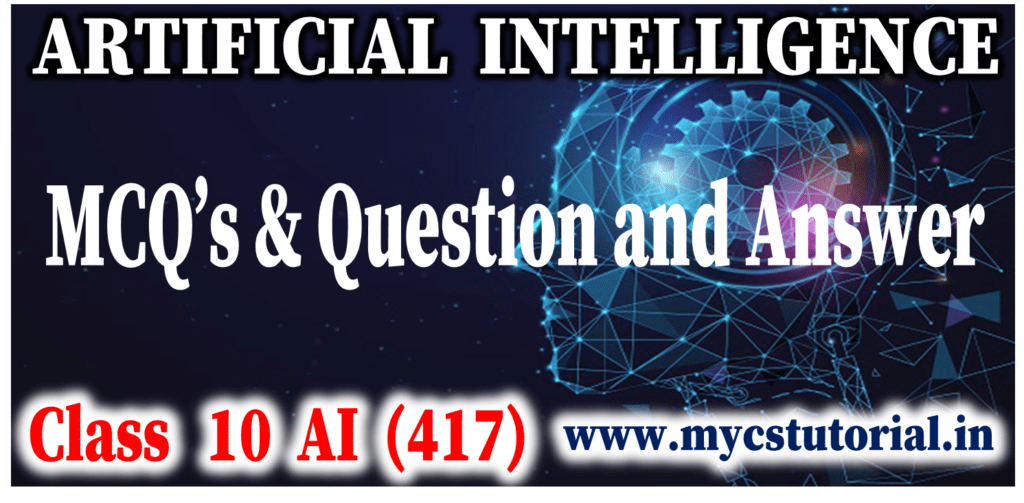Class 10 Artificial Intelligence Question Bank: Basics of AI
Three (03) Mark Questions
1. What do you understand by AI bias? Discuss in detail with some examples.
Answer: AI bias is the underlying prejudice in data that’s used to create AI algorithms, which can ultimately result in discrimination and other social consequences.
AI Bias can creep into algorithms in several ways. AI systems learn to make decisions based on training data, which can include biased human decisions or reflect historical or social inequities, even if sensitive variables such as gender, race, or sexual orientation are removed. Amazon stopped using a hiring algorithm after finding it favored applicants based on words like “executed” or “captured” that were more commonly found on men’s resumes, for example. Another source of bias is flawed data sampling, in which groups are over- or underrepresented in the training data.
For Example
• Majorly, all the virtual assistants have a female voice. It is only now that some companies have understood this bias and have started giving options for male voices but since the virtual assistants came into practice, female voices are always preferred for them over any other voice. Can you think of some reasons for this?
• If you search on Google for salons, the first few searches are mostly for female salons. This is based on the assumption that if a person is searching for a salon, in all probability it would be a female. Do you think this is a bias? If yes, then is it a Negative bias or Positive one?
2. What do you understand by Data Privacy? Discuss in detail with some examples.
Answer: Data privacy, sometimes also referred to as information privacy, is an area of data protection that concerns the proper handling of sensitive data including, notably, personal data but also other confidential data, such as certain financial data and intellectual property data, to meet regulatory requirements as well as protecting the confidentiality and immutability of the data. It focuses on how to collect, process, share, archive, and delete the data in accordance with the law.
Privacy, in the broadest sense, is the right of individuals, groups, or organizations to control who can access, observe, or use something they own, such as their bodies, property, ideas, data, or information.
Control is established through physical, social, or informational boundaries that help prevent unwanted access, observation, or use. For example:
• A physical boundary, such as a locked front door, helps prevent others from entering a building without explicit permission in the form of a key to unlock the door or a person inside opening the door.
• A social boundary, such as a members-only club, only allows members to access and use club resources.
• An informational boundary, such as a non-disclosure agreement, restricts what information can be disclosed to others.
Privacy of information is extremely important in this digital age where everything is interconnected and can be accessed and used easily. The possibilities of our private information being extremely vulnerable are very real, which is why we require data privacy.
3. What do you understand by AI, ML & DL? How are they different from each other?
Answer:
a) Artificial Intelligence (AI)
AI is incorporating human intelligence to machines. Whenever a machine completes tasks based on a set of rules that solve problems (algorithms), such an “intelligent” behavior is what is called artificial intelligence.
b) Machine Learning (ML)
ML is a subset of AI that uses statistical learning algorithms to build smart systems. The ML systems can automatically learn and improve without explicitly being programmed.
c) Deep Learning (DL)
In Deep Learning, the machine is trained with huge amounts of data which helps it in training itself around the data. Such machines are intelligent enough to develop algorithms for themselves.

How they differ?
• Deep Learning is the most advanced form of Artificial Intelligence out of these three. Then comes Machine Learning which is intermediately intelligent and Artificial intelligence covers all the concepts and algorithms which, in some way or the other mimic human intelligence.
• Therefore, AI is the umbrella term which covers ML and DL.
4. Why do apps collect data in our phone?
Answer: One of the major sources of data for many major companies is the device which all of us have in our hands all the time: Smartphones. Smartphones have nowadays become an integral part of our lives. Most of us use smartphones more than we interact with people around us. For the facilities that smartphones provide us, Apps need a lot of data which is collected from the user like details about your face, browsing history, or your geographic location, contact list etc. This data is collected with user’s consent which he/she gives at the time of installing an app by clicking on “yes” or “allow” options which clearly means that we ourselves are giving permissions to the Apps.
Permissions by themselves are harmless and even useful to provide users a good mobile experience.
This data is collected to provide us with a lot of facilities and features which have made our lives easier. Another reason to collect the data is to provide us with customized recommendations and notifications according to our choices.
One more reason to collect the data is to make their app more accurate and efficient.
5. Should AI replace laborious jobs? Is there an alternative for major unemployment?
Answer: Yes, AI should replace laborious jobs.
● AI can replace laborious jobs like lifting of heavy items, working in mines etc.
● AI can indeed automate most repetitive and physical tasks.
● In future, AI would be a good option in the field of architecture and construction.
OR
No, AI should not replace laborious jobs completely as if it replaces laborious jobs completely, then there will be no source of income for the daily wage workers due to unemployment. So, industry owners can use some machines but more of man power. Hence the production will not get affected as humans are smarter than machines since they were the ones who invented AI.
Note: As this is an open-ended question so both the answers (yes/No) are correct but it must be with correct justification.
Is there an alternative for major unemployment?
● AI taking over laborious jobs won’t create unemployment. It is just a groundless fear. The standard view of technical change is that some jobs are displaced by the substitution of machines for labour, but that the fear of total displacement is misplaced because new jobs are created, largely due to the technology-fuelled increase in productivity. Humans have always shifted away from work suitable for machines and to other jobs.
● The basic fact is that technology eliminates jobs, not work. If this level of AI revolution will happen, lots of job opportunities will be created. For example: 20-30 years ago, being an accountant was a lucrative job, but AI took over this job but this created a lot of opportunities, it raised the demand of a software engineer, data scientist, etc.
● It will open doors to skillful jobs rather than doing laborious tasks.
● Thus, we will be able to cope with the level of major unemployment, if AI took over laborious jobs.
6. As Artificially Intelligent machines become more and more powerful, their ability to accomplish tedious tasks is becoming better. Hence, it is now that AI machines have started replacing humans in factories. While people see it in a negative way and say AI has the power to bring mass unemployment and one day, machines would enslave humans, on the other hand, other people say that machines are meant to ease our lives. If machines over take monotonous and tedious tasks, humans should upgrade their skills to remain their masters always.
What according to you is a better approach towards this ethical concern? Justify your answer.
Answer:
● AI taking over laborious jobs won’t create unemployment. It is just a groundless fear. The standard view of technical change is that some jobs are displaced by the substitution of machines for labour, but that the fear of total displacement is misplaced because new jobs are created, largely due to the technology-fuelled increase in productivity. Humans have always shifted away from work suitable for machines and to other jobs.
● The basic fact is that technology eliminates jobs, not work. If this level of AI revolution will happen, lots of job opportunities will be created. For example: 20-30 years ago, being an accountant was a lucrative job, AI took over this job but this created a lot of opportunities, it raised the demand of a software engineer, data scientist, etc.
● It will open doors to skillful jobs rather than doing laborious tasks.
● Thus, we will be able to cope with the level of major unemployment, if AI took over laborious jobs.
7. List down various sensors that are present in a smartphone. Also list down the type of data which gets collected through them.
Answer:
• ACCELEROMETER [ helps running AR applications and track steps]
• GPS [ Location Data]
• Gyroscope [Orientation Data]
• Magnetometer [ Direction and Magnetic Field Data]
• Biometric Sensors [Fingerprint ,Iris, Face data]
CASE STUDY BASED QUESTIONS
1. (Case Study) AI and robotics have raised some questions regarding liability. Take for example the scenario of an ‘autonomous’ or AI-driven robot moving through a factory. Another robot surprisingly crosses its way and our robot draws aside to prevent collision. However, by this manoeuvre the robot injures a person.
a) Who can be held liable for damages caused by autonomous systems?
Answer: It is actually very difficult to blame anyone in such a scenario. Here is the situation where AI Ethics come in to the picture. Here, the choices might differ from person to person and one must understand that nobody is wrong in this case. Every person has a different perspective and hence he/she takes decisions according to their moralities.
But still if someone is to be liable then it should be the programmer who has designed the algorithm of the autonomous vehicle as he/she should have considered all the exceptional conditions that could arise.
b) List two AI Ethics.
Answer: AI Bias, AI Access, Data privacy, AI for kids. (Any two out of the following)
By Anjeev Kr Singh – Computer Science Educator
Published on : September 18, 2022 | Updated on : February 9, 2023








